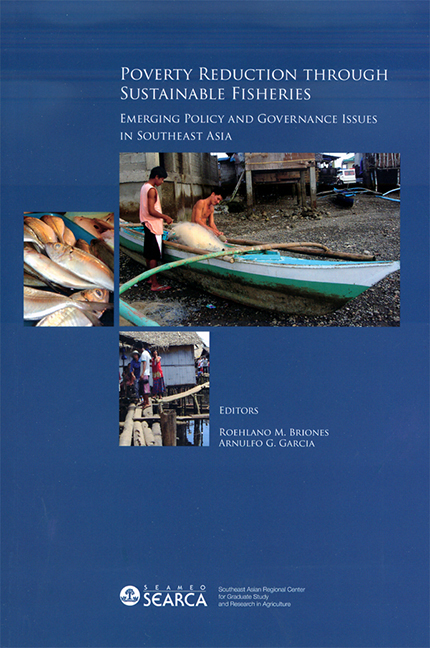 Poverty Reduction through Sustainable Fisheries
Poverty Reduction through Sustainable Fisheries Book contents
- Frontmatter
- Contents
- Figures
- Tables
- Foreword
- Acknowledgments
- 1 Introduction and Synthesis
- 2 Fish and the Poor
- 3 Fish and the Poor: The Case of Cambodia
- 4 Changing Demand and Supply Structure of Fish in Asia: Past Trends and Future Projections
- 5 Regional Economic Integration of the Fisheries Sector in ASEAN Countries
- 6 Technology Policies for Capture Fisheries and Aquaculture in Southeast Asia
- 7 The Status, Current Trends and Future Directions for Production and Technology of Fisheries in Southeast Asia
- 8 The Seafood Supply Chain and Poverty Reduction
- 9 Strategy for the Empowerment of Aquaculture Fish Farmers in Indonesia
- 10 Status of Coastal and Marine Resources: Implications for Fisheries Management and Poverty in Southeast Asia
- 11 Property Rights and Institutional Arrangements in Southeast Asian Fisheries
- 12 Regional Cooperation in Aquatic Resource Management for Southeast Asia
11 - Property Rights and Institutional Arrangements in Southeast Asian Fisheries
Published online by Cambridge University Press: 21 October 2015
- Frontmatter
- Contents
- Figures
- Tables
- Foreword
- Acknowledgments
- 1 Introduction and Synthesis
- 2 Fish and the Poor
- 3 Fish and the Poor: The Case of Cambodia
- 4 Changing Demand and Supply Structure of Fish in Asia: Past Trends and Future Projections
- 5 Regional Economic Integration of the Fisheries Sector in ASEAN Countries
- 6 Technology Policies for Capture Fisheries and Aquaculture in Southeast Asia
- 7 The Status, Current Trends and Future Directions for Production and Technology of Fisheries in Southeast Asia
- 8 The Seafood Supply Chain and Poverty Reduction
- 9 Strategy for the Empowerment of Aquaculture Fish Farmers in Indonesia
- 10 Status of Coastal and Marine Resources: Implications for Fisheries Management and Poverty in Southeast Asia
- 11 Property Rights and Institutional Arrangements in Southeast Asian Fisheries
- 12 Regional Cooperation in Aquatic Resource Management for Southeast Asia
Summary
ABSTRACT
This paper reviews and synthesises available literature about fisheries management, property rights systems, and other institutional arrangements.
It begins with an overview of the fundamental components of rights-based systems and uses this information to analyse the similarities and difference of common characteristics of the property rights systems spectrum, from conventional to alternative. The paper also gives an overview of various elements of community-based and co-management approaches – i.e., the ways in which stakeholders, especially fishers, communities, and governments interact. The paper examines the community-based fisheries management systems in several case studies from fisheries in Southeast Asia, looking at the respective elements of (i) rights-based systems and (ii) collaborative management approaches.
In closing, the paper identifies some of the current knowledge gaps and their implications for region-wide research and policy towards improving well-being amongst poor fisheriesdependent households in Southeast Asia.
INTRODUCTION
In the fisheries management arena, three lessons have been learned over time:
Fisheries are finite and as a result, catch has to be similarly finite. Even tropical fisheries have a finite number of fish, and there must be limits to the amount of fish caught.
Since fisheries are finite, not everyone can make a profit out of it. Participation in fisheries also has to be finite, which means that access to capture fisheries must be limited.
Even if access and participation are limited, fishermen can still overfish their fisheries. There are many examples of limited access fisheries that have either implicit or explicit limits on total catches (total allowable catches or TACs) and are overfished, over capacitated, and unprofitable. Thus, it is not enough to limit participation and catch; there also has to be a sharing mechanism that determines clearly who gets what.
In addition, there are two more lessons increasingly being understood by fishermen, policy makers, and fisheries managers. First is that centrally imposed, command and control regulatory regimes are not compatible with commercial forces that exist in fisheries. Indeed, command and control schedules increase fishing costs for fishermen and motivate them to catch more fish, either legally or, in desperation, illegally.
- Type
- Chapter
- Information
- Poverty Reduction through Sustainable FisheriesEmerging Policy and Governance Issues in Southeast Asia, pp. 233 - 260Publisher: ISEAS–Yusof Ishak InstitutePrint publication year: 2008


